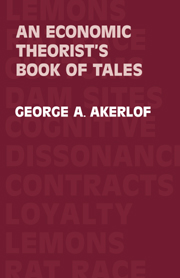Book contents
- Frontmatter
- Contents
- Acknowledgments
- 1 Introduction
- 2 The market for “lemons”: quality uncertainty and the market mechanism
- 3 The economics of caste and of the rat race and other woeful tales
- 4 The economics of “tagging” as applied to the optimal income tax, welfare programs, and manpower planning
- 5 A theory of social custom, of which unemployment may be one consequence
- 6 Jobs as dam sites
- 7 The economic consequences of cognitive dissonance with William T. Dickens
- 8 Labor contracts as partial gift exchange
- 9 Loyalty filters
- Index
8 - Labor contracts as partial gift exchange
Published online by Cambridge University Press: 18 December 2009
- Frontmatter
- Contents
- Acknowledgments
- 1 Introduction
- 2 The market for “lemons”: quality uncertainty and the market mechanism
- 3 The economics of caste and of the rat race and other woeful tales
- 4 The economics of “tagging” as applied to the optimal income tax, welfare programs, and manpower planning
- 5 A theory of social custom, of which unemployment may be one consequence
- 6 Jobs as dam sites
- 7 The economic consequences of cognitive dissonance with William T. Dickens
- 8 Labor contracts as partial gift exchange
- 9 Loyalty filters
- Index
Summary
This paper explains involuntary unemployment in terms of the response of firms to workers' group behavior. Workers' effort depends upon the norms determining a fair day's work. In order to affect those norms, firms may pay more than the market-clearing wage. Industries that pay consistently more than the market-clearing wage are primary, and those that pay only the market-clearing wage are secondary. Thus, this paper also gives a theory for division of labor markets between primary and secondary.
Introduction
In a study of social relations among workers at a utility company in the eastern United States, George Homans [1953, 1954] observed that a small group of young women (doing a job called “cash posting”) exceeded the minimum work standards of the firm by a significant margin (i.e., on average by 15 percent). Most of these women neither desired nor expected promotion in the firm in return for their troubles. Why did they do it?
Section II shows that the standard neoclassical model cannot simultaneously explain both the behavior of the firm and the behavior of the cash posters. But, as shown in Section III, application of a standard sociological model does explain the behavior of both the young women and their employer. According to this model, in their interaction workers acquire sentiment for each other and also for the firm. As a consequence of sentiment for the firm, the workers acquire utility for an exchange of “gifts” with the firm – the amount of utility depending upon the so-called “norms” of gift exchange.
- Type
- Chapter
- Information
- An Economic Theorist's Book of Tales , pp. 145 - 174Publisher: Cambridge University PressPrint publication year: 1984
- 4
- Cited by



